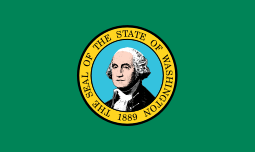Naval Base Kitsap
| Naval Base Kitsap | |
|---|---|
 | |
| Coordinates | 47°43′14″N 122°42′47″W / 47.72056°N 122.71306°WCoordinates: 47°43′14″N 122°42′47″W / 47.72056°N 122.71306°W |
| Type | U.S. naval base/military base |
| Garrison information | |
| Current commander | Capt. Alan Schrader |
| Occupants |
13,000 active-duty personnel 13,000 DoD civilian employees 10,000 contractors[1] |
Naval Base Kitsap is a U.S. Navy base located on the Kitsap Peninsula in Washington state. It was created in 2004 by merging the former Naval Station Bremerton with Naval Submarine Base Bangor. The Mission of Naval Base Kitsap is to serve as the home base for the Navy’s fleet throughout West Puget Sound and to provide base operating services, including support for both surface ships and Fleet Ballistic Missile and other nuclear submarines having their home ports at Bremerton and Bangor.
Naval Base Kitsap also provides service, programs, and facilities to meet the needs of their hosted combat commands, tenant activities, ships' crews, and civilian employees. Naval Base Kitsap is the largest naval organization in Navy Region Northwest, and it is composed of installations at Bremerton, Bangor, Manchester, Indian Island, and Keyport, Washington. Naval Base Kitsap was the recipient of the 2005 Commander in Chief's Award for Installation Excellence - the Best Base in the U.S. Navy.[2]
Naval Base Kitsap is the third-largest Navy base in the U.S.[1] It features one of the U.S. Navy's four nuclear shipyards, one of two strategic nuclear weapons facilities, the only West Coast dry dock capable of handling a Nimitz-class aircraft carrier and the Navy's largest fuel depot."[1]
History
Bangor
Serving the U.S. Pacific Fleet, this Trident submarine base is the one of only two such bases operated by the U.S. Navy. The Trident submarine base at Kings Bay, Georgia, used by the U.S. Atlantic Fleet is the only other. Nearby is Strategic Weapons Facility Pacific (SWFPAC), where missiles are stored and maintained.
Bremerton
Naval Base Kitsap is home to Naval Hospital Bremerton.
Recent history
In 2010, after purchasing the base's first hybrid bus on April 29, 2010, Naval Base Kitsap purchased two additional hybrid buses, with five others to be delivered by the end of July. The diesel-electric vehicles are the Navy's first hybrids and were funded through the GSA American Recovery and Reinvestment Act (ARRA) Replacement/Exchange Program and are overseen by NAVFAC, the Navy's non-tactical vehicle program manager.[3]
On Nov. 2, 2009, five protesters, including 82-year-old priest William J. Bichsel, S.J., cut through two fences to reach an area near where nuclear warheads are stored in bunkers. The protesters put up banners, sprinkled blood on the ground, scattered sunflower seeds and prayed until they were arrested; all faced prison sentences.[4] Bichsel was released from federal prison on February 9, 2012.[5]
Units, warships and submarines
(as of November 2010)
- Commander, Carrier Strike Group Three
Bangor |
Bremerton |
References
- 1 2 3 "Kitsap Navy base is getting a new boss". The Seattle Times. January 11, 2011. Retrieved 2011-01-12.
- ↑ "Naval Base Kitsap - About > Mission". Retrieved 2009-06-10
- ↑ Waller, Darrell (1 July 2010). "Navy Buys First "Green" Buses for Naval Base Kitsap.". US Navy. Retrieved 2011-01-12.
- ↑ https://www.google.com/hostednews/ap/article/ALeqM5iCCU_ylE9gQ1k4cDqzFAPc3dV4qQ?docId=7ba9e8af59f64e3187660edcc19fd06e
- ↑ William Jerome Bichsel, inmate # 86275-020,Federal Bureau of Prisons, U.S. Dep't of Justice, at .
External links
| Wikimedia Commons has media related to Naval Base Kitsap. |
- NB Official website
- globalsecurity.org: Bangor
- globalsecurity.org: Bremerton
- Post-Vietnam: Non-Violence at Bangor, a multimedia history of protests at the Bangor Military Base from the Pacific Northwest Antiwar and Radical History Project.
- Defense Commissary Agency
